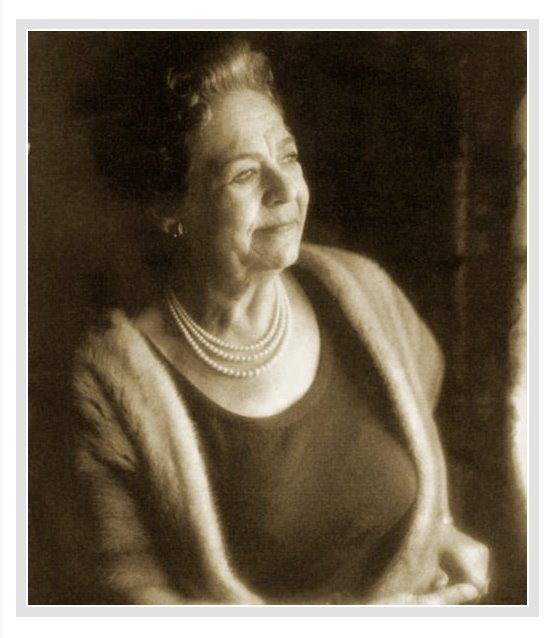

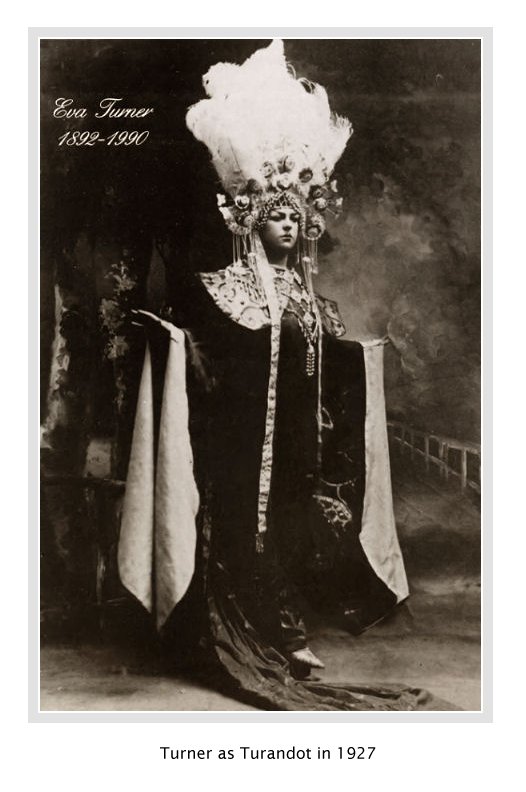 A dramatic soprano with a voice of mammoth proportions, Eva Turner, though
scarcely neglected in her native country, enjoyed many of her greatest successes
abroad. Most closely identified with the title role in Turandot (which she first sang in Brescia
only a month after its premiere), she brought to all of her roles a voice
of both enormous size and great cutting power, topped with an unflagging ease
in the highest register. While not always an illuminating actress, she approached
all of her work with seriousness of purpose, thorough integrity and no small
measure of excitement.
A dramatic soprano with a voice of mammoth proportions, Eva Turner, though
scarcely neglected in her native country, enjoyed many of her greatest successes
abroad. Most closely identified with the title role in Turandot (which she first sang in Brescia
only a month after its premiere), she brought to all of her roles a voice
of both enormous size and great cutting power, topped with an unflagging ease
in the highest register. While not always an illuminating actress, she approached
all of her work with seriousness of purpose, thorough integrity and no small
measure of excitement.Having studied with Dan Rootham (teacher of the legendary contralto Dame Clara Butt) at London's Royal Academy of Music and, subsequently, with Albert Richards Broad (under whose tutelage her voice grew considerably in size), Turner made her debut in 1916 with the Carl Rosa Company as the Shepherd in Tannhäuser. She remained with the company until 1924, quickly graduating to the spinto and dramatic soprano repertory, and winning positive reviews as Brünnhilde, Fidelio, Aïda and Tosca. In 1924, her Butterfly and Leonore were heard by conductor Ettore Panizza, who urged her to travel to Italy to audition for Toscanini at La Scala. Having sung only in English up to that point, Turner knew only one aria in Italian. Nonetheless, she gave a strong audition. Given a contract for the following season, Turner spent four months coaching the roles -- Freia to be sung under Vittorio Gui (who soon became a close friend) and Sieglinde with Panizza himself. The signal successes she enjoyed in both roles led almost immediately to numerous offers from other Italian houses and many in Germany (there, ironically, for roles in the Italian repertory). After her first Turandot in 1926, Franco Alfano's comment that he considered her ideal for the title role only accelerated the speed with which offers materialized. Later, Turner sang both Sieglinde and Leonore at the Maggio Musicale Fiorentino. An engagement in Buenos Aires precluded Turner's accepting the London premiere of Turandot in 1927, but the company of singers with which she sailed to Argentina afforded her several long-lasting friendships, Claudia Muzio becoming as especially close colleague. Minnie in Fanciulla del west proved another congenial part, added to Turner's repertory in Lisbon. When she was able to offer London her Turandot in 1928, she also sang as Santuzza and Aïda. Her June 5 Covent Garden debut as Turandot brought superlatives (as did Santuzza in which she was deemed "equal to the best Italians"). In 1928, she recorded her astonishing "In Questa Reggia," still the standard by which all other Turandots are judged. Turner's Sieglinde in 1930 won high praise despite a sound considered too grand for such a put-upon character. Turner made an auspicious American debut as Aïda with the Chicago Opera in 1928. Amelia and Sieglinde were other roles during that first Chicago season, the latter part in a cast including Frida Leider, Maria Olszewska, and Alexander Kipnis (as Wotan). The following year, she sang Elisabeth to Leider's Venus. In 1938, she gave Chicago a triumphant Turandot. The onset of WWII prevented Turner from singing more than a very few Isoldes, a role she loved deeply. Upon retirement, she taught voice, first in America, later in at the Royal Academy in London. She was made a Dame of the British Empire in 1962. -- Biogrphy (text only) by Erik
Eriksson
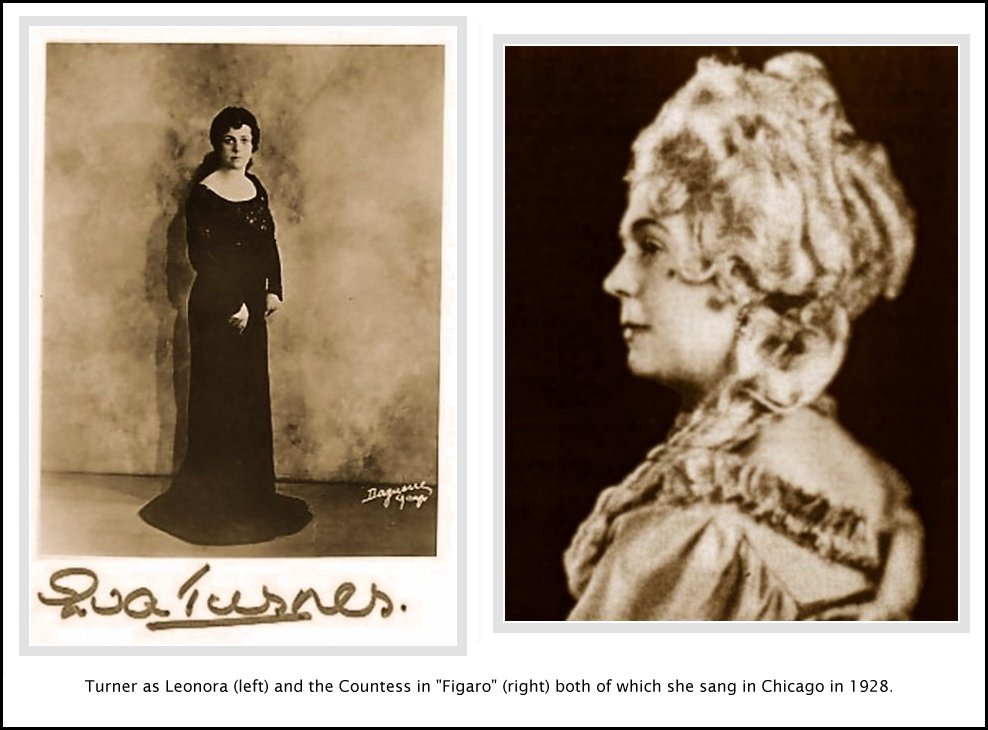
|
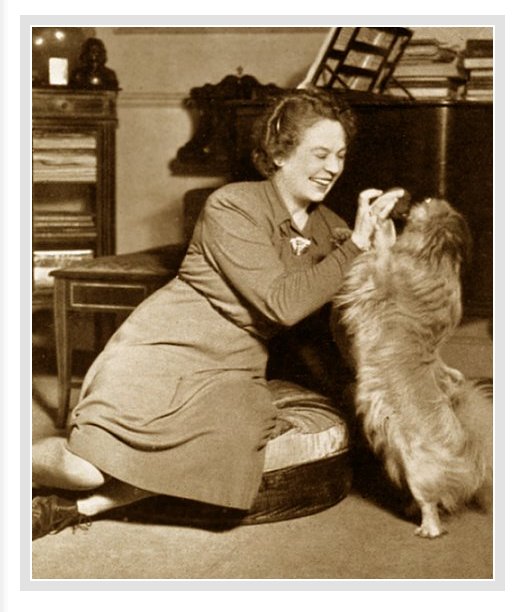
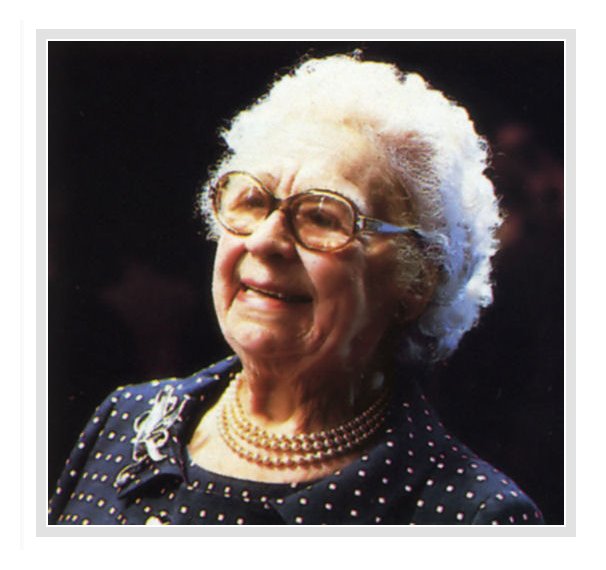 In April of 1986, about a month and a half after her 94th birthday, she
agreed to allow me to call her on the telephone. [Two of her wonderful letters are reproduced at
the bottom of this webpage.] I was in Chicago and she was at
home in London. I was never awe-struck by any of the musicians I met,
but Dame Eva immediately put me at my ease with her cheery demeanor.
Being of English, Irish and Scottish extraction myself, I reveled in her accent
and manner, especially the way she rolled the letter r.
In April of 1986, about a month and a half after her 94th birthday, she
agreed to allow me to call her on the telephone. [Two of her wonderful letters are reproduced at
the bottom of this webpage.] I was in Chicago and she was at
home in London. I was never awe-struck by any of the musicians I met,
but Dame Eva immediately put me at my ease with her cheery demeanor.
Being of English, Irish and Scottish extraction myself, I reveled in her accent
and manner, especially the way she rolled the letter r. 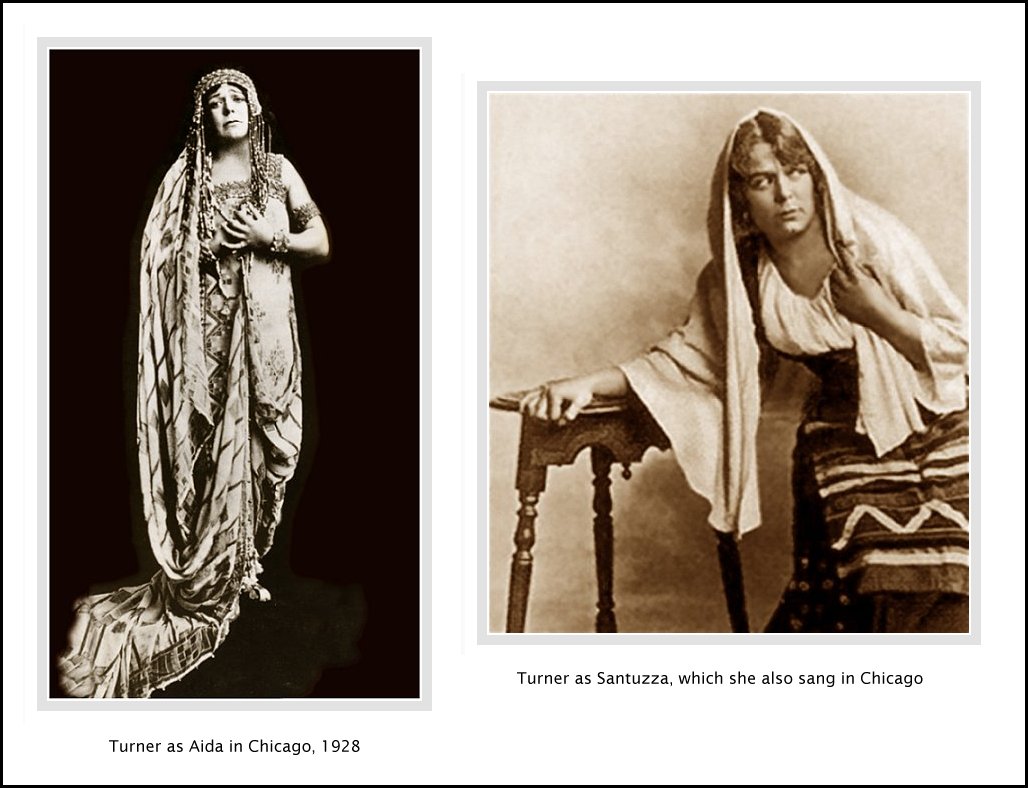
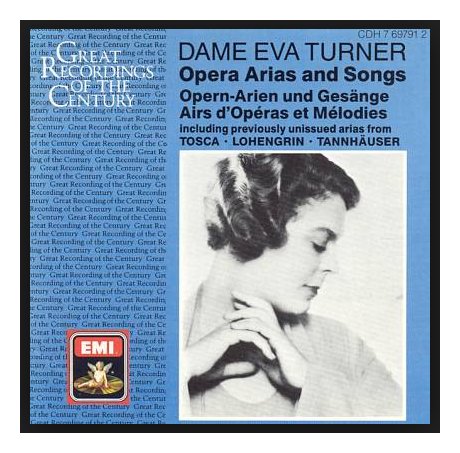 Dame Eva: Oh no! One always feels one could
do better. [Laughs] One wishes to do it again. Actually,
I wish I had done many more, but I was always rather busy.
Dame Eva: Oh no! One always feels one could
do better. [Laughs] One wishes to do it again. Actually,
I wish I had done many more, but I was always rather busy. 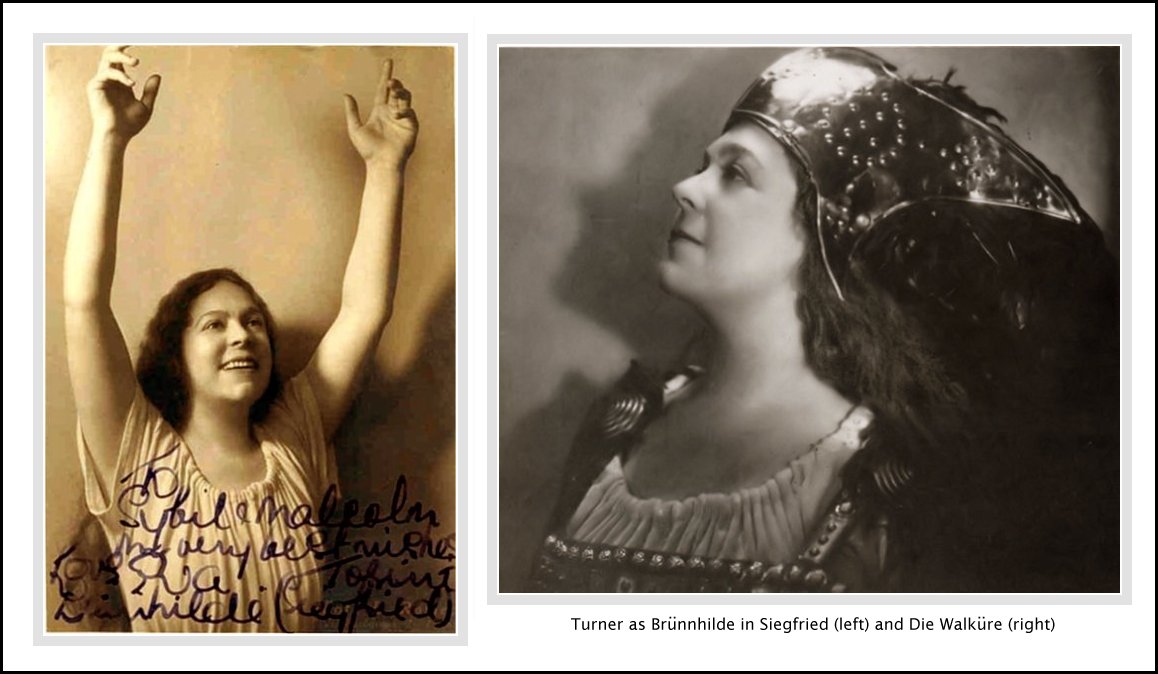
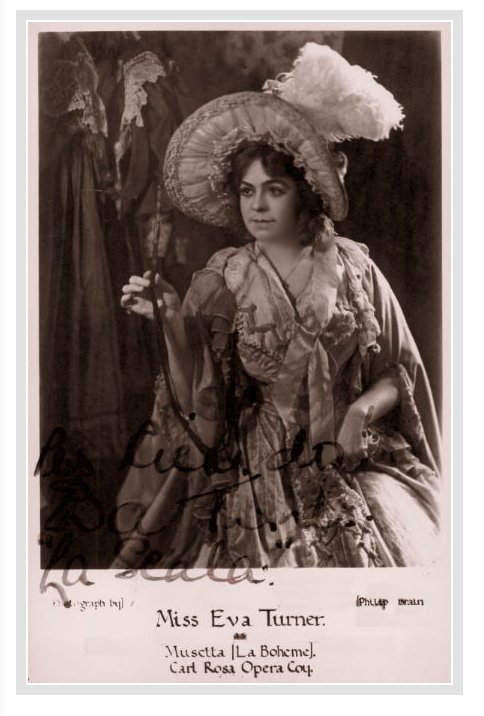 Dame Eva: [Laughs] Oh, I don't know.
That would require really a lot of thought. But I always tried to do
them to the best of my ability.
Dame Eva: [Laughs] Oh, I don't know.
That would require really a lot of thought. But I always tried to do
them to the best of my ability.|
From the New York Philharmonic comes word of the death of Carlos Moseley, whose remarkable career with the orchestra lasted from 1955 to 1985. He was 98 years old. Carlos DuPré Moseley was born on Sept. 21, 1914, in Laurens, S.C., to Carlos Roland and Helen Allston DuPré Moseley. He majored in English at Duke University, graduating with honors in 1935. An accomplished pianist, he had been playing in jazz groups and giving recitals when, in 1941, he began studying in New York and Philadelphia under Olga Samaroff, the ex-wife of Leopold Stokowski. During World War II, Mr. Moseley worked for the Office of War Information in New York, then promoted American music abroad for the State Department from 1946 to 1948. He was arts administrator of the occupation government in Bavaria in 1949. From 1950 to 1955 he directed the University of Oklahoma’s music school. "Beginning as Director of Press and Public Relations," the announcement says, "he rose to become Managing Director (a post now referred to as Executive Director), President, and Chairman of the Board." Moseley presided over the Bernstein-Boulez era at the Philharmonic, during which the orchestra cut an uncommonly bold and unpredictable profile. He was an elegant, courtly man, whose South Carolina accent probably fooled more than a few Easterners into underestimating his intelligence and savoir faire. He was, above all, deeply musical, a pianist of considerable skill; while studying at the Berkshire Music Center (now Tanglewood), he played Brahms's fiendishly difficult Second Piano Concerto, under the direction of the young Bernstein. -- Alex Ross (from his blog) and
Robert D. McFadden (in The New York Times)
|
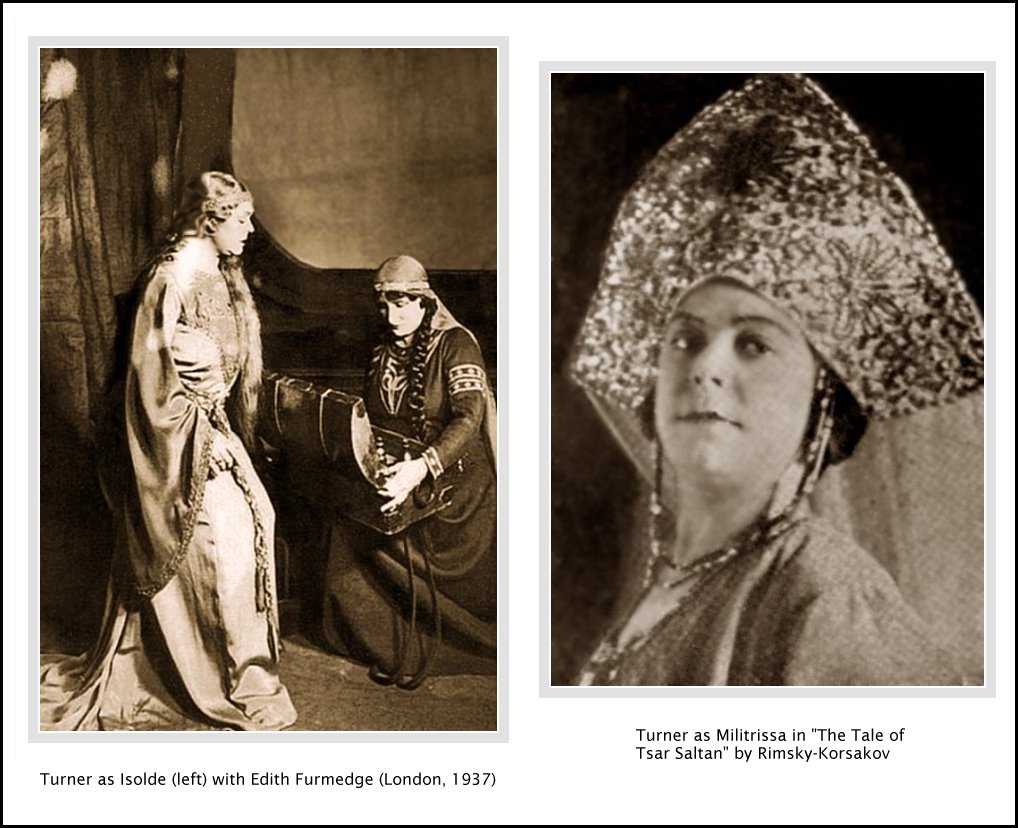

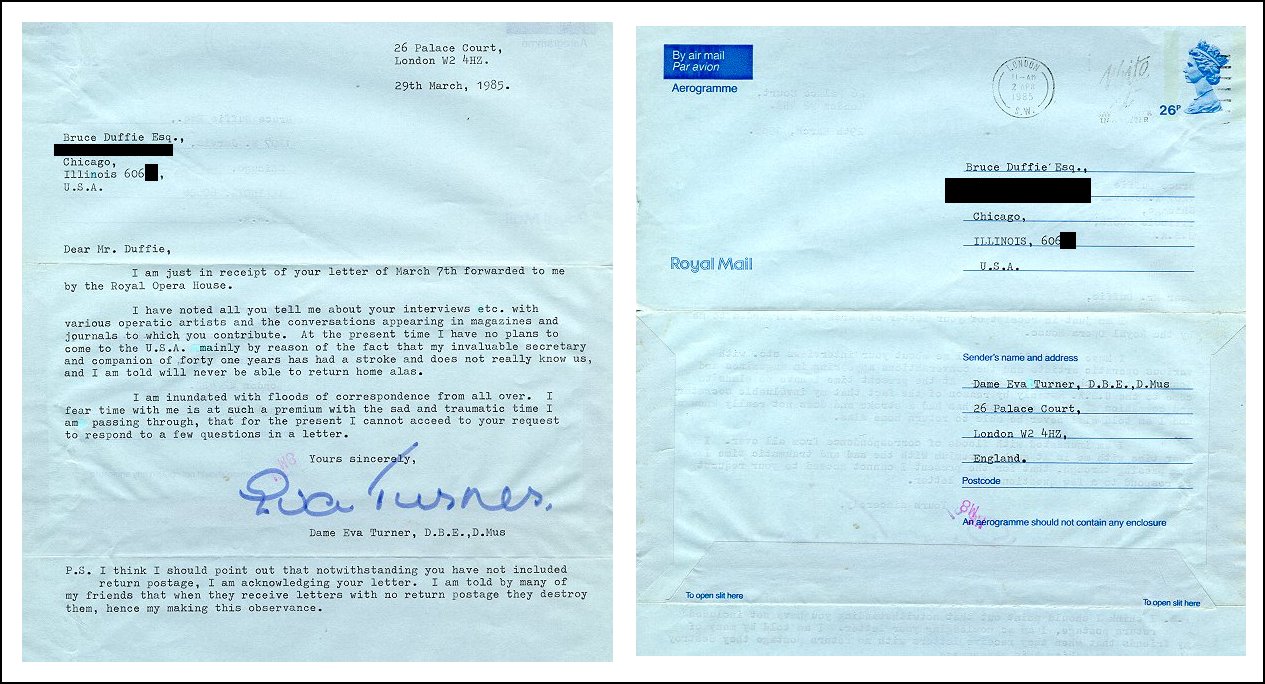
Having been chastised about the postage,
my reply included several British stamps!
Her next response was a letter in an envelope.
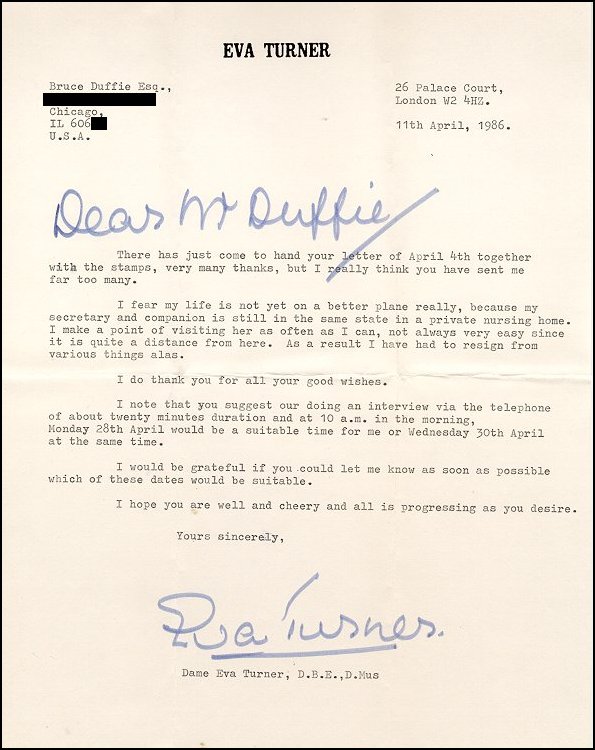
© 1986 Bruce Duffie
This conversation was recorded on the telephone on April 30, 1986.
Portions were broadcast on WNIB the following year, and again in 1990, 1992
and 1997. This transcription was made in 2014, and posted on this website
at that time.
To see a full list (with links) of interviews which have been transcribed and posted on this website, click here. To read my thoughts on editing these interviews for print, as well as a few other interesting observations, click here.
Award - winning broadcaster Bruce Duffie was with WNIB, Classical 97 in Chicago from 1975 until its final moment as a classical station in February of 2001. His interviews have also appeared in various magazines and journals since 1980, and he now continues his broadcast series on WNUR-FM, as well as on Contemporary Classical Internet Radio.
You are invited to visit his website for more information about his work, including selected transcripts of other interviews, plus a full list of his guests. He would also like to call your attention to the photos and information about his grandfather, who was a pioneer in the automotive field more than a century ago. You may also send him E-Mail with comments, questions and suggestions.